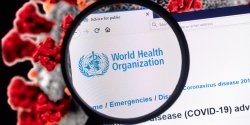Published: 29.07.2022

• The Intergovernmental Negotiating Body (INB) has just concluded its second session in Geneva to discuss the so-called "anti-pandemic treaty".
• WHO prepared a working draft treaty that the member states discussed in Geneva.
• The project recognizes the "WHO's central role in pandemic prevention, preparedness and response as an international steering and coordination body, convening and generating scientific evidence".
• Discussion on whether the treaty should be binding or non-binding was not broadcast by the INB to the public.
• By November 2022, the INB Bureau will develop another draft based on additional contributions from Member States and formal negotiations will begin.
• According to the assumptions of the INB, the treaty should be adopted by the end of May 2024.
On July 18-22, 2022, the second session of the Intergovernmental Negotiating Body, established in order to develop an international instrument for global health coordination under the leadership of the World Health Organization, took place in Geneva.
At the meeting in Geneva, the discussion of the Member States started by examining a working draft drawn up on the basis of contributions previously collected from countries and private entities admitted to the INB's work. First of all, the analyzed draft outlines a set of general principles which should be inspired by the treaty and what provisions it should contain. The vision that guides the entire document is strongly focused on "respect for human rights, solidarity and justice", which in the international legal landscape have often constituted general terms, interpreted in such a broad sense that they included safeguards not recognized in the international convention (e.g. the right to abortion).
Another general and vague principle set out in the contract and recognized as key to achieving the indicated goals is the so-called "right to health", which should be understood - as the INB presidium writes - "as a state of complete physical, mental and social well-being." The described "right to health" should be considered in the light of the Sustainable Development Goals - which include universal access to abortion - and the principles of "gender equality" as a starting point for an effective pandemic preparedness and prevention structure. On this subject, the Working Draft concludes that: "Pandemic prevention, preparedness and response will take into account the specific needs of women and girls, while a country-specific, gender-responsive, participatory and fully transparent approach".
Following the initial recognition of states' sovereignty in public health matters, the draft agreed to recognize the central role of WHO in pandemic prevention, preparedness and response as an international steering and coordination body, convening meetings and generating scientific evidence. In the same context, the working project speaks of "measures to establish, regularly update and extend the implementation of the Global Peer Review Mechanism to assess national, regional and global preparedness capabilities and gaps, by connecting nations to support a government-wide approach".
Another critical point in the working draft that countries discussed in the second reissue session is item 13 on "Pandemic and public health coping skills". misinformation or disinformation are key elements in achieving and maintaining the objective of the international instrument to be adopted. At this point, when developing international, regional or national legislative, administrative, technical and / or other measures to prevent a pandemic, Member States should take take into account measures to counter "disinformation, disinformation and fake news, and to promote and facilitate pandemic education and public awareness programs". According to the text, states should also be involved in developing measures to "design communications and messages for the public".
During the sessions, delegations made many comments on the content of the agreement, with almost all agreeing to a stronger focus on human rights and justice. Among the stakeholders who spoke, Gavi Alliance and Women in Global Health stressed the need to respect gender equality - all genders, a spokeswoman for Women in Global Health said - in order to incorporate this principle into all provisions. As for the clause or the non-binding nature of the contract - the discussion on this is not broadcast by INB. However, in the speech summarizing the entire Session, Dr. Tedros Adhanom Ghebreyesus, WHO Director General addressed the words to the students: the binding nature of the instrument is very important and timely to be what you have decided. Articles 19 or 21 of the WHO Constitution.
Agenda agreed by individual delegations at the end of subsequent meetings as next steps: before integrating integration and state of states by September 28, introducing future regional from August to 28, AD ... development of the site development project before December INB from 7 2022. that the international agreement will be adopted in May 2024.

02.05.2025
· The Ordo Iuris Institute, the Hungarian Center for Fundamental Rights, and the Foundation of the Patriots for Europe group in the European Parliament organized a conference in W

09.04.2025
• On April 8, the Ordo Iuris Institute presented the Polish version of a document with proposals for reforming the European Union, prepared jointly with Hungary’s Mathias Corvinus Collegium (MCC).

08.04.2025
Sixth Court Hearing Ends Without Progress

07.04.2025
In response to the liberal left’s self-proclaimed “militant democracy” in Poland and